2018 is almost over, and we have another year in the dataset: an improbable number of celebrities died in 2016. The stock market is down, and everyone thinks a crash is coming. Journalists are being killed around the world. Fidget spinners aren’t cool anymore. Fortnite. Trade wars.
But not everything is terrible: Makerbot released a new printer and oddly no one complained. It was just accepted that it was an overpriced pile of suck. Elon Musk is having a great year, press and Joe Rogan notwithstanding, by launching a record number of rockets and shipping a record number of cars, and he built a subway that we’re not calling a subway. FPGA development is getting easier with new platforms and new boards. There is a vast untapped resource in 18650 cells just sitting on sidewalks in the form of scooters, and I’m going to keep mentioning this until someone actually builds a power wall out of scooters.
What we haven’t seen in 2018
When it comes to small, portable Linux devices, there hasn’t been a better year than 2016. That’s the year that brought us dozens of new, fun boards that would certainly be the future of embedded computing. Take a look at the Pine64, the first 64-bit Linux-based single board computer. OrangePi did something that can be described as ‘cattywampus’. Even Intel got in the game, but they forgot to write documentation.
How about 2018? Well, Raspberry Pi released the Pi 3 Model A+, but that’s really just a Pi 3 Model B with fewer parts. Other than that, there’s not much. 2018 did not see dozens of single board computers based on smartphone SOCs. C.H.I.P. died, which is great for anyone who has to type ‘C.H.I.P.’ frequently, less so for people who were counting on Open Linux modules that had complete register documentation.
What caused the development of tiny Linux SBCs to stall? The reasons for this range from companies waiting for next-generation SOCs to come out (doubtful), to the fact that people simply aren’t buying them. Could it be that the general public is realizing that a cheap ARM board with zero software support is a false economy? I highly doubt this is the case, but then again I have a very low opinion of people.
Oh, but 2019 is going to be great
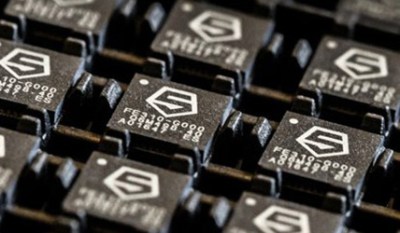
RISC-V has been on the tip of our tongue for a few years now, and already we have really fast microcontrollers based on this architecture (that are also really expensive, but that’s beside the point). 2019 is shaping up to be one of the biggest years yet for RISC-V, and with that popularity comes decreasing prices. SiFive is releasing a multicore processor that runs Linux. There are smaller, lower-power RISC-V cores and completely random online shops on TaoBao are selling RISC-V cores.
The RISC-V proposition has always been a weird one. Yes, it’s a big-O Open architecture for everything from microcontrollers to Systems on a Chip. But it’s just a design. You need fab houses cranking out silicon wafers with RISC-V chips on them. That’s expensive at first, but then the price starts to drop. It looks like 2019 is shaping up to be the year that everyone can get their hands on a RISC-V chip.
Graphics cards are affordable again
The markets are down 7% this year. Bitcoin is down slightly more.
At this time last year, a single Bitcoin was worth sixteen thousand dollars, USD. Now, it’s worth less than a quarter of that. Unlike earlier Bitcoin bubbles, the price has not corrected — this is a year-long bubble bursting. Those people who thought Bitcoin would be worth $500,000 USD by 2020 have some debts to pay off.
The Bitcoin price crash is having a few unintended consequences. Power companies in western Washington aren’t freaking out anymore because miners are turning their machines off. Bitmain, one of the largest suppliers of ASIC miners, is having trouble with TSMC. It’s almost unprofitable for anyone to mine Bitcoin, and nobody knows what will happen to the network when that happens. But there’s an upside: graphics cards are more affordable. A completely acceptable 1070Ti (perfect for Fortnite, the game of the year for 2018) has fallen from $650 to $450. We’re seeing fewer people pitching ‘blockchain solutions’ in the Hackaday tipline.
The lesson from the Bitcoin crash? If you ever get a time machine, buy some Bitcoin in 2009. Sell them in December, 2017. Put twenty Lamborghinis in your Lamborghini account. If you’re building a PC soon, put that money you’re saving on a graphics card into a nice power supply.
We’re finally turning our back on Facebook
This is a year that rocked Facebook. It started years ago when a Facebook app developer (no, not someone working for Facebook, this is a third party who wrote a Facebook ‘app’) gathered information on about 200,000 of his app’s users and eighty seven million of those app user’s friends. This data was sold to Cambridge Analytica, where the data was used in the presidential campaigns of Ted Cruz and Donald Trump, and in the UK’s Brexit referendum.
What will 2019 hold for Facebook? I forsee the ‘un-cooling’ of Facebook. In 2006, you were cool if you had a Facebook. You could only have a Facebook if you had a college email address. It was an exclusive club. 2019 will be the year that you’re only cool if you don’t have a Facebook account. We’re looking at ‘I deleted my Facebook’ hipsterism. Everyone else is going to lose, though, because I deleted mine in 2009. I’m way cooler than you.
Red Star OS is the only Linux distro better than Hannah Montana Linux
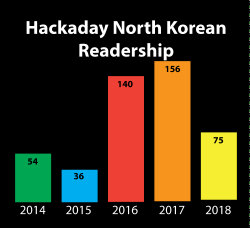 This is becoming a thing because I’ve been doing it for five years. Hackaday’s North Korea readership plunged 50% this year. One person probably switched VPNs.
This is becoming a thing because I’ve been doing it for five years. Hackaday’s North Korea readership plunged 50% this year. One person probably switched VPNs.
But on the whole, things are looking up for Hackaday. This year we published the most articles of any previous year. 2018 saw another year of the Hackaday Prize, where we awarded $250,000 to the most amazing projects on the Internet. The community is growing, and Hackaday is going gangbusters. We’ve gone to more events than we can count this year.
This has been a strange year. The market is falling, which means everyone thinks there’s going to be a crash, which probably means there won’t be. But things are looking up, and we’re looking forward to another year of hacks in 2019.

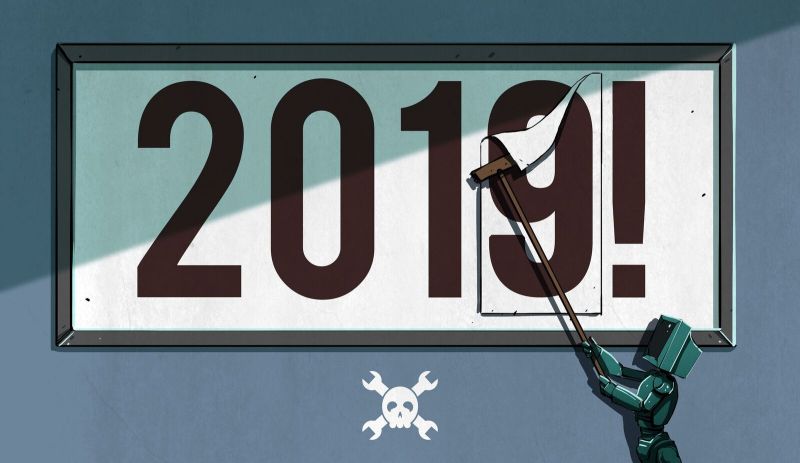
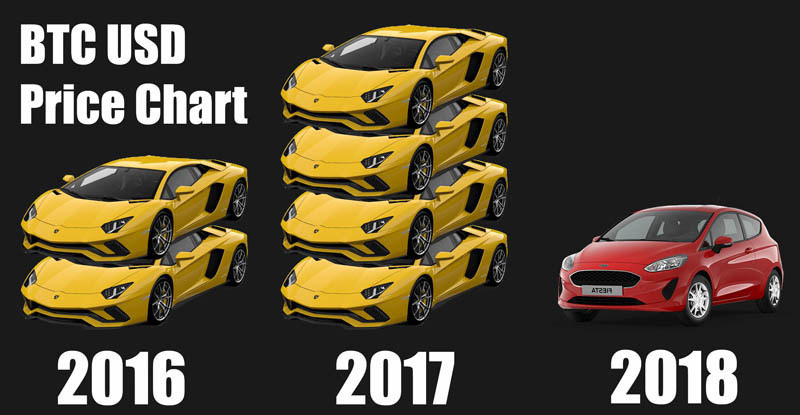











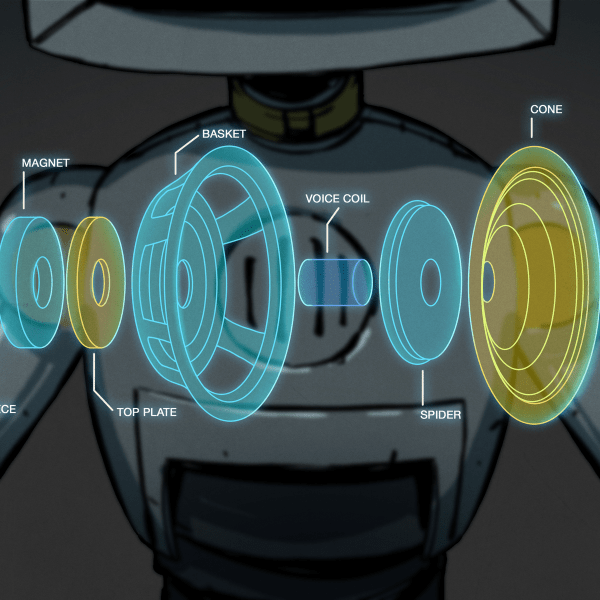

But didn’t an improbable number of celebrities also die in 2018?
“When it comes to small, portable Linux devices, there hasn’t been a better year than 2016.”
And I really had hopes 2017 and 2018 would be even better.
(sad face)
Okay, I misread that,
you REALLY meant 2016.
Not really. Look at the era in which they ascended to celebrity status (whatever that means), and the parallel growth in media consumption.
Geodata visualization people have a derisive sneer for maps of events that aren’t normalized against population density. They say “Congratulations, you’ve made a map that shows where the people are.”
I think there’s a similar idea for population data. People get old. Old people die. Congratulations, you’ve observed that people you’ve heard of are, in fact, people.
Er, that last “population data” should say “mortality data”. My kingdom for an edit button, or at least the sense to realize there isn’t one and proofread first.
No. The same was asked last year. It just seems that way. But how many Indian or Chinese celebrities do you know?
No, but the number of improbable celebrities is increasing.
LOL!
(thanks, as I catch my breath!)
I want to see a chart showing the use of Hannah Montana Linux in North Korea.
Next year…
But right now her nemesis “Rhoda Dakota” is making headway.
followed by Noah Jersey, of course.
Long Island = Lawn-Guy-Land
Git off my lawn!
I thought that was Alaska Nebraska
Thought Hannah Montana changed her name to Idaho.
No, actress who played her became “I’m a ho!”
I got ‘cool’ back in 2012 when I realized I couldn’t stop my family from redistributing my photos or my ex from spying on my biz. Facebook has been so not cool for so long, get with it people!
Facebook has tried hard to make people and businesses depend on it, because then Facebook can zuck quite a lot and they’d still put up with it.
I know some businesses who don’t have a web page in any format, except for a Facebook page.
Yup, my girlfriend’s business is one of them. Honestly, it’s right under Etsy in terms of gross sales generated, so it’s not a negligible source of income.
What is she selling? Hand knitted Wireless Mouse Cozies?
There’s a niche…
“so it’s not a negligible source of income. ”
The son of a former boss of mine, made a small box with a cable and a switch. He sold them online to owners of Mercedes autos. they used them to reset something.
He didn’t sell enough to make a living, but it was a source of income for him.
“It’s almost unprofitable for anyone to mine Bitcoin, and nobody knows what will happen to the network when that happens.” I’ve seen this argument before, and the same thing has happened every time: Not much. Difficulty falls a bit and mining continues. Older miners are shut down in favor of newer miners and/or cheaper electricity. Also, technically, GPU prices fell due to alt-coin prices falling. GPUs have not been profitable to mine bitcoin directly for years. If anything, alt-coin prices have fallen more than bitcoin, so GPUs are not profitable to mine much of anything at this point. That is definitely good news for those of use who use GPUs for what they are intended for: 3D rendering. ;-)
Or for other awesome projects ;)
Ah. A new year, and hopefully a makeover of hackaday.io so it actually delivers content readable by users and a more economic screen real estate usage. *Maybe* i will open a page longer than 1.2 sec. After falling for a link to that horrible non-site…
Wow, you’re full of sunshine and lolipops today. Heh.
Screw that. Read this…
“HBO’s “Silicon Valley” has been delayed until mid-next year, Variety has confirmed. The comedy series will now begin production on the new season in summer 2019, meaning the season may not air until 2020”
We all dream of a better tomorrow. :)
“I’m going to keep mentioning this until someone actually builds a power wall out of scooters.”
These critters are infesting the Paris streets too :-/
How long until they are officially A BAD IDEA and outlawed ?
I hadn’t checked the byline on this one, but I knew it was a Benchoff article as soon as I saw that suggestion about turning stray electric scooters into a power wall.
Sometimes less is more…
Brian, how many points do I get if I never had a Facebook account?
Either “Uber Kewl” or, “under a rock”.
You probably have a Facebook account, you just aren’t the one who created it.
B^)
People who never had a Facebook account couldn’t figure it out because they are too Analog and therefore NOT COOL.
P.S. I never had a Facebook account because the Kardashians had some.
…and I enjoyed Earl Grey tea BEFORE Capt. Jean-Luc Picard appeared on television!
J E Hoovers wet dream manifest?
A dossier system with the subjects -willingly- filling in the data fields for him.
On average I fully agree with “I have a very low opinion of people” , but there are always interesting anomalies.
I think he actually means:
human beeing : something I have a very low opinion of
That colon was supposed to be a : equally by definition
Damn formatting…
Still no hackaday article on open-isa.org and RV32IM giveaway?
Even a simple open on the mission statement from article link, I rarely read an io page because it has to be *very* interesting for me to sift through to the actual project. Maybe even a cookie to default to oldest first for those who want it
Facebook has needed a (several?) replacement for some time, but I don’t know where to go.
It’s terrific for keeping touch with distant friends and special interest groups. The Apple II group is fantastic, for example. FB was excellent for bringing people together, but lousy for archiving and sharing information. Where should, for example, the Apple II group go?
I’m saddened and frustrated not to see some sort of open source social media ecosystem arising, maybe hosted through archive.org or something similar. Even a turbo-BBS would be a good start, I think.
I’m off FB, but missing the genuine interactions that happened there.
turbo-BBS? How about Craigslist?